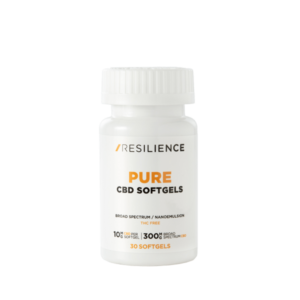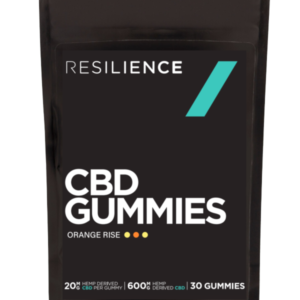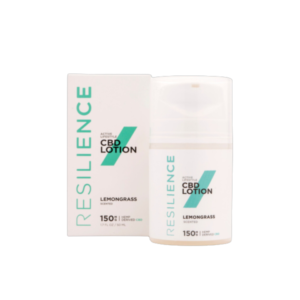
It’s the day of the big game, and you start to feel the immensity of what’s to come—your heart starts beating like a drum, your chest begins to tighten, and you feel as if your brain is performing an acrobat routine inside your head—you’re dizzy, achy, and maybe even a bit foggy.
The stress response you feel throughout your body is stimulated by cortisol, a stress hormone that operates as part of your endocrine system, which controls your body’s energy levels, metabolism, and growth, and responds to injuries, mood, and stress.
There are many ways to manage elevated cortisol levels, whether it’s going for a jog around your neighborhood or adding a CBD softgels to your daily routine. If you struggle to manage feelings of unease, you’re not alone—this guide is here to help you explore the connection between CBD and cortisol to help keep you calm and relaxed, even when life gets a little crazy.
Key Takeaways
- Cortisol, a stress hormone, can spike in times of high stress, and chronically high levels of cortisol can lead to chronic and deadly health conditions.
- Managing stress levels is important to maintain good health. Adding more exercise, healthy food, and relaxing activities to your routine can help keep cortisol levels in check.
- Adding a CBD supplement to your daily routine may help to support stress management and relax your mind and body.
What is Cortisol?
Cortisol is your body’s stress hormone—it alerts your brain to any pressure or danger you may be experiencing to help your body react appropriately to the perceived threat.
The hormone is produced in your adrenal glands and is connected to your body’s stress response. However, cortisol is also an important player in several other critical bodily functions, such as:
- Metabolic regulation
- Blood sugar level control
- Blood pressure regulation
- Inflammation management
- Memory formulation
- Sleep regulation
Once your adrenal glands produce cortisol, the pituitary gland and the hypothalamus join in to help secrete the cortisol, which then binds to cortisol receptors throughout the body.
When everything is functioning properly, the amount of cortisol secreted is balanced with the body’s needs. However, certain conditions can cause things to go haywire and your cortisol levels can get too high.
What Can Cause a Spike in Cortisol Levels?
Several factors can lead to higher than normal cortisol levels. These may include:
- Stressful situations
- Tumors on the adrenal glands
- Pituitary gland tumors
- Certain medications
In stressful situations, your cortisol level may spike but should return to normal once the situation is resolved. However, if cortisol levels fail to level out, your overall health may suffer.
Why is Too Much Cortisol Harmful to Your Body?
When your cortisol level remains high, your body remains in a constant state of high alert.
Think about how you feel when you panic because you can’t find your keys or when you’re on the precipice of a hill while riding a rollercoaster—your heart rate elevates, you start to sweat, and your mind races.
If your cortisol levels stay at this elevated level, your body remains in that high alert state. Chronically high stress levels can lead to a wide range of poor health outcomes. Some of the most commonly experienced include:
- Mental fogginess – When you’re nervous about something, you have a hard time focusing on other tasks. Chronically elevated cortisol levels can have a serious impact on your ability to concentrate and fight through brain fog.
- High blood pressure – The release of cortisol into your bloodstream causes a temporary increase in your heart rate and a narrowing of your blood vessels. Your blood pressure goes up and then settles down after the cortisol has done its job. When you’re chronically in a state of high stress, your blood pressure also remains high.
- Unhealthy weight gain – Continuously high cortisol levels can cause you to gain weight rapidly, even without a change to your diet or exercise routine. The most common areas of weight gain due to cortisol are around your abdomen, face, and chest.
- Elevated blood sugar levels – When your cortisol levels are too high for too long, your blood sugar levels can also suffer. In its normal capacity, cortisol produces glucose that gives your body energy to react. However, continually high cortisol levels can lead to an overproduction of glucose and high blood sugar.
- Cardiovascular disease – The factors that contribute to cardiovascular disease (high blood pressure, obesity, and elevated blood sugar) are often caused by high cortisol levels.
- Disrupted sleep – When your brain is constantly on high alert, you have a tough time falling asleep at night. You may also struggle to stay asleep or fall into the deep sleep necessary for good overall health. Furthermore, sleep and athletic performance coincide, so when you have entered a state of sleep deprivation, your ability to crush your fitness goals may become more challenging.
- Poor mental health – When you’re always apprehensive, it’s difficult to have a positive outlook on life. Poor sleep and general bad health also interfere with your mental health and can lead to feelings of disquiet and uncertainty.
What is the Connection Between CBD and Cortisol?
Now, when your body is on high alert, it’s optimal to try to calm yourself down by practicing deep breathing, participating in light exercise, or adding calming supplements to your routine.
That’s where CBD comes into play.
CBD is a cannabinoid that’s known to interact with your body’s endocannabinoid system, which regulates homeostasis throughout your body. However, it may have an impact on your endocrine system as well.
When ingested or applied, CBD interacts with naturally occurring cannabinoid receptors throughout your body. These receptors are often found on glands, like the adrenal glands, which secrete cortisol. As such, CBD may be able to influence the secretion level of these glands.
While the full relationship of the CBD cortisol connection is not yet known, there is some indication that CBD can affect cortisol secretion. One small study of 11 volunteers analyzed the cortisol levels of subjects before and two hours after taking either 300 mg of CBD or a placebo. Those who were given CBD showed a decrease in cortisol levels more so than those given the placebo.
In addition, CBD may be able to support stress management and support healthy blood pressure and heart health, which may mitigate the effects of elevated cortisol levels.
What Steps Can You Take to Keep Cortisol in Check?
While chronically elevated cortisol levels can lead to health problems like weight gain, high blood pressure, and sleep troubles, there are ways to keep stress levels under control. To that end, you can curate a healthy, stress-free lifestyle by:
- Setting aside time for exercise – It’s a widely known fact that exercise can contribute to an elevated mood. Even after just 20 to 30 minutes of movement, people report feeling calmer and more relaxed. Finding time in your daily schedule for exercise can help manage cortisol levels while also keeping your body at a healthy weight.
- Getting healthy, refreshing sleep – High cortisol levels can keep you awake at night and sleep deficiency can cause cortisol levels to spike. Therefore, getting enough rest is critical to managing cortisol. Once you have determined the best CBD dosage for sleep given your unique biology, placing CBD oil under your tongue before bed may help support healthy restful sleep so you can wake up feeling more refreshed.
- Eating nutritious foods – When people feel stressed, many often resort to altering their eating habits, whether it’s devouring a bag of chips or avoiding food altogether. However, neither produces positive results. Maintaining healthy eating habits, even during times of high stress, may help lower cortisol levels. To that end, eat fresh produce, complex carbohydrates, and foods rich in omega-3 fatty acids when you start feeling uncomfortable.
- Making time for activities you enjoy – Taking your mind off of your concerns for a little while may also help moderate cortisol levels. Grab a good book, flip through Netflix, or watch your favorite movie. If you enjoy crafting, use your hands to make something new for your home. You can also complete a crossword puzzle or assemble a model airplane to help manage your stress levels.
- Meditating – According to the American Psychological Association, mindfulness meditation might be useful for managing stress. In a review of over 200 studies, researchers found a link between stress reductions and a regular mindfulness meditation practice. You can practice mindful meditation at home or participate in a guided class to help you get the hang of it.
- Keeping a journal – Writing down your concerns can help make them feel more manageable. Keeping a journal is an excellent way to work through some of the uncertainties in your life. It can also help you gain perspective and even work through some of the apprehension you feel about your life.
- Devising a calming routine – There are many effective ways to settle your mind. One of our favorites is to sink into a warm bath infused with a CBD bath bomb. Taking this little bit of time for yourself may help you feel more calm and relaxed so you can address whatever life throws your way.
Finally, you don’t have to start adding all of these practices to your life at once. This might be a little overwhelming. Instead, focus on introducing a few small changes at a time. Once you see an improvement in how you feel, it’ll be easier to add more healthy lifestyle practices.
Keep Your Mind Calm and Relaxed with Resilience CBD
While everyone gets a little nervous and uneasy from time to time, chronically elevated cortisol levels may lead to a life-threatening condition and it’s important to keep your stress in check.
The good news is there are many stress-relieving practices you can adopt to keep your mind and body relaxed, such as exercising, meditating, and adding CBD to your routine with Resilience CBD.
Our CBD products come with a unique Label Accuracy Guarantee™ so you can shop with confidence knowing that you’re getting exactly what the label promises. Take charge of your recovery with Resilience CBD.
A CBD product can have a great effect on your body, physically and mentally. With the wide variety of CBD products, including CBD gummies, CBD oils, CBD creams, and more, you can find the right product and dosage for you to help keep your cortisol from spiking to a high level.
Sources:
Endocrine Society. Adrenal Hormones. https://www.endocrine.org/patient-engagement/endocrine-library/hormones-and-endocrine-function/adrenal-hormones
PubMed. Physiology, Cortisol. https://www.ncbi.nlm.nih.gov/books/NBK538239/
PubMed. Chronic Stress, Cortisol Dysfunction, and Pain. https://www.ncbi.nlm.nih.gov/pmc/articles/PMC4263906/
PubMed. Effect of Cannabidiol on Plasma Prolactin, Growth Hormone, and Cortisol in Human Volunteers. https://pubmed.ncbi.nlm.nih.gov/8257923
American College of Sports Medicine. The Role of Exercise in Stress Management. https://journals.lww.com/acsm-healthfitness/fulltext/2013/05000/stress_relief__the_role_of_exercise_in_stress.6.aspx.%C2%A0
PubMed. Interactions Between Sleep, Stress, and Metabolism. https://www.ncbi.nlm.nih.gov/pmc/articles/PMC4688585/
PubMed. Stress and Eating Behaviors. https://www.ncbi.nlm.nih.gov/pmc/articles/PMC4214609/
APA. Mindfulness Meditation: A Research-Proven Way to Reduce Stress. https://www.apa.org/topics/mindfulness/meditation







